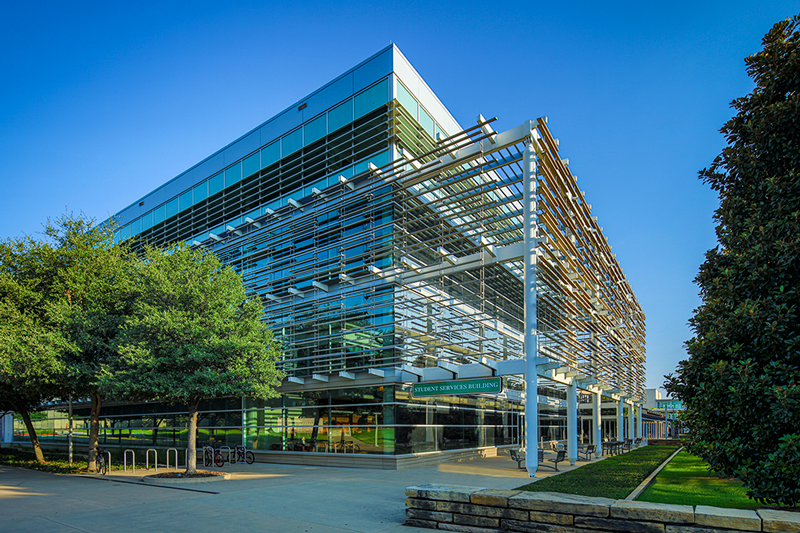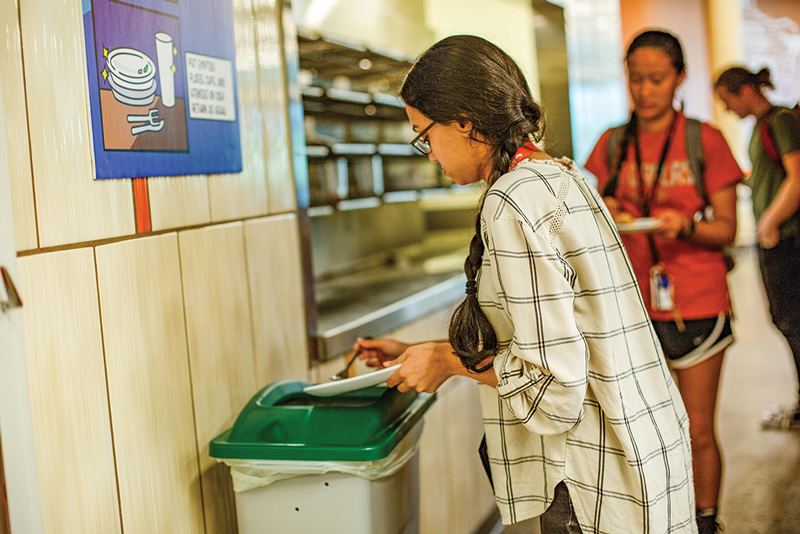Sustainability in Operations
April 6, 2020
Yen Pham, Eco Rep
Caitlin Griffith, Sustainability Coordinator
UT Dallas is committed to incorporating sustainability throughout operations. Some of the ways UT Dallas has been able to build a culture of sustainability in operations is through pursuing Leadership in Energy and Environmental Design (LEED [Leadership in Energy and Environmental Design] ) building certifications, protecting pollinator habitat, and making concerted efforts to reduce waste wherever possible on campus.
Facilities Management has prioritized building energy efficient buildings, pursuing LEED certification on a number of campus constructions. LEED certified buildings on campus include the Student Services Building (2010), School of Management Addition (2014), Edith O’Donnell Arts & Technology Building (2013), Residence Hall West Complex (2014), Bioengineering and Science Building (2015), Davidson-Gundy Alumni Center (2017), and Engineering and Computer Science West Building (2018). In addition to these, Parking Structure 1 (2013) is a net-zero energy garage that supplies all its own energy through a solar array installed on the top level.
Campus green building specifications and design details
UT Dallas is committed to stewarding our land and resources in a sustainable manner to help the conservation and protection of pollinators. Our hope is that through education and hands-on learning, students and staff will have the knowledge and confidence to emulate our conservation projects in their own homes and communities. UT Dallas strives to be a campus where learning goes beyond the classroom and land serves to protect the native habitat. As a Bee Campus USA, UT Dallas is responsible for a series of commitments to promote pollinators and pollinator-friendly habitats on campus. These commitments include maintain and oversight committee, hosting annual awareness events, sponsoring service projects, offering pollinator-based curriculum, and developing a Campus Pollinator Habitat Plan.
A Monarch Waystation is a site that is rich with pollinator friendly plants and native wildflowers that supports monarch butterflies during their migration between Canada and Mexico throughout the year. UT Dallas is within the monarch’s migration path. Because of this, we have worked with Facilities Management to build four certified Monarch Waystations; the largest on campus housing our disc golf course.
Information and guidance on Monarch Waystations (PDF [Portable Document Format File] )
UT Dallas has developed waste management and waste minimization through the Campus Race to Zero Waste, Comet Composting Training, and food-waste reduction by dining services. Campus Race to Zero Waste is an annual friendly competition for universities in the U.S. and Canada to compare campus waste reduction efforts over an 8-week period. The goal for UT Dallas during this competition is to decrease our overall landfill waste and to increase our rate of recycling. Essentially, students are encouraged to use less, and to recycle more.
The food and beverages provided through UT Dallas Dining Services are mostly sustainable or ethically produced. Additionally, UT Dallas Dining Services prioritizes minimizing food waste through tray-less and reusable to-go containers and by donating food rather than disposing it. We also offer food composting at our Dining Hall as well as composting bins available for students living on campus followed by composting training (both included in student fees!(. Dining Hall West is known for being a zero-waste facility, since it does not utilize single-use plastics and all scraps from the hall are composted.
Lastly, our university offers recycling throughout campus inside and outside school buildings, apartment complexes, as well as special recycling streams services. Single stream recycling includes paper, cardboard, glass, aluminum, steel, and plastics #1-5 & 7. Our special recycling streams services include batteries, cardboard, clothing and shoes, confidential paper shredding, electronics, metal, nitrile gloves, plastic wrap, printer cartridges and toner, and used binders. The Offices of Sustainability and Housing have partnered with the World Wear Project to collect and recycle shoes, clothing, and other textile materials. We have two large blue containers specifically for clothing recycling installed near campus housing locations which can be located using our Sustainability Map (PDF [Portable Document Format File] ).
More information on campus recycling efforts


